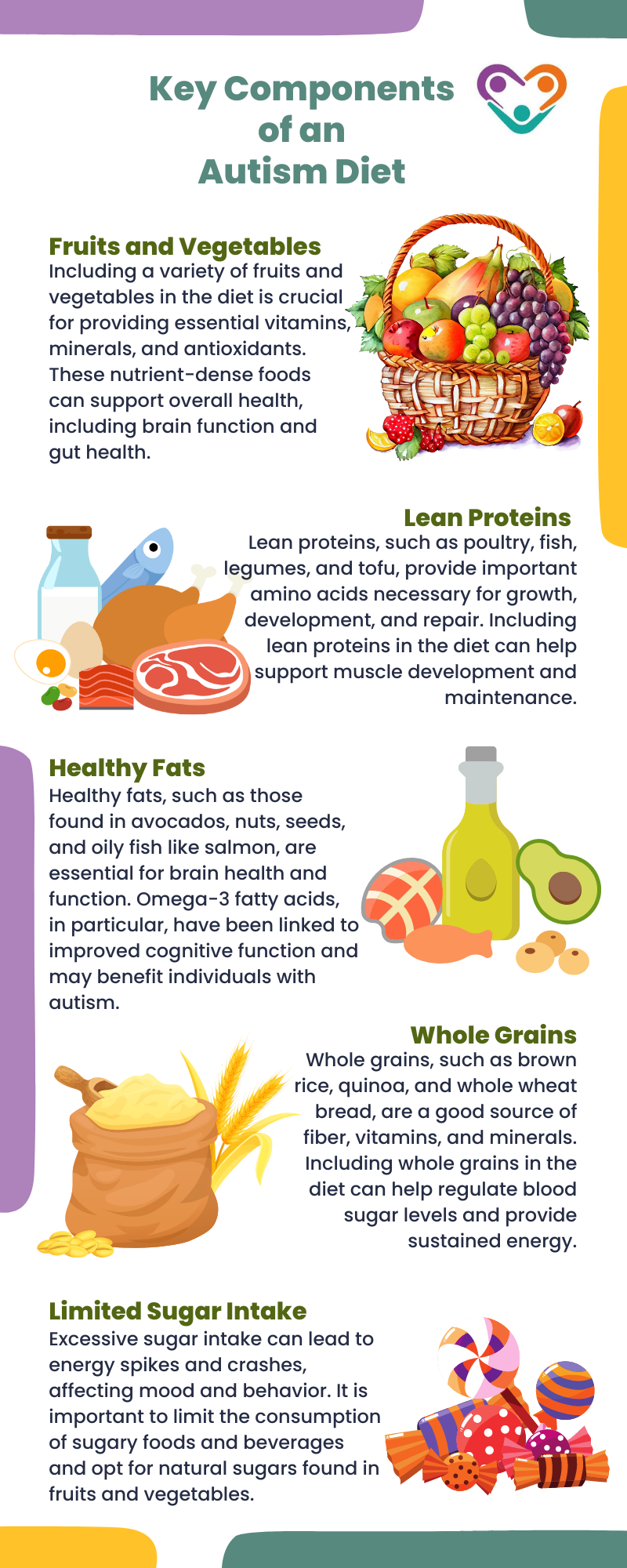Autistic individuals may have sensory issues that make it challenging to eat certain foods. Sensitivities to light, touch, sound, and taste can affect the variety of foods they consume. This can result in unwanted weight gain, constipation, and a risk of nutritional deficiency.
It is not uncommon for autistic individuals to have specific food aversions or preferences, which can make mealtimes more challenging.
To address these challenges, it is crucial to work with a dietitian or healthcare professional who specializes in autism. In the meantime, we’re here to provide you with a reliable diet plan that you can give your autistic child.

Autism Diet Strategies
There are several strategies that can be considered to support the overall well-being of individuals with autism as far as crafting an autism diet plan is concerned.
One popular dietary intervention within the autism community is the gluten and casein-free diet (GFCF diet). This diet involves avoiding foods that contain gluten, found in wheat, rye, and barley, as well as foods that contain casein, found in cow, goat, and sheep milk.
While there is limited scientific evidence to support the effectiveness of the GFCF diet in improving autism symptoms, some individuals with autism, particularly those with gastrointestinal issues, may experience benefits from this dietary approach.
The removal of gluten and casein from the diet is believed to reduce inflammation and alleviate digestive problems that can be associated with autism.
It’s important to note that implementing a gluten and casein-free diet requires careful planning and consideration to ensure nutritional adequacy. These dietary restrictions can potentially lead to weight loss and affect growth, especially in children.
Therefore, consulting with a healthcare professional or dietitian is essential to ensure that the diet is balanced and provides all the necessary nutrients for optimal health.
Balancing Nutritional Requirements
While specific dietary interventions like the GFCF diet may be chosen, it’s crucial to balance the nutritional requirements of individuals with autism as well. A well-rounded diet that includes a variety of nutrient-dense foods is essential for overall health and well-being.
Fruits and vegetables should be an integral part of an autism diet plan. After all, they provide essential vitamins, minerals, and antioxidants that support the body’s functions and promote overall health. Including a colorful array of fruits and vegetables ensures a diverse range of nutrients.
Lean proteins are also important for individuals with autism. Protein-rich foods such as poultry, fish, beans, and tofu provide essential amino acids that aid in the growth, repair, and maintenance of body tissues. Including lean proteins in the diet helps support muscle development and overall strength.
To ensure balanced nutrition, it is recommended to work with a healthcare professional or dietitian who can assess individual needs and provide personalized guidance.
They can help create a customized autism diet plan that meets the specific nutritional requirements of each individual while taking into account their sensory issues, food aversions, and any existing gut health concerns.

Creating a Healthy Autism Diet Plan
Creating a healthy diet plan for individuals with autism requires a focus on providing balanced nutrition while considering their specific needs and challenges. A well-designed autism diet plan can play an essential role in minimizing some of the symptoms of autism spectrum disorder (ASD), improving gut health, and promoting overall well-being.
An optimal diet for autism should focus on improving gut health, reducing sugar intake, increasing omega-3 fatty acid intake, and ensuring an adequate intake of key vitamins and minerals.
While there are no specific nutritional requirements unique to autism, a well-balanced diet is important for good health and development in individuals with autism, just like anyone else.
To create a healthy autism diet plan, consider incorporating the following key components:

Role of Fruits, Vegetables, and Lean Proteins
Fruits, vegetables, and lean proteins all play a vital role in an autism diet plan. Here’s why they are important:
- Fruits – Fruits are packed with essential vitamins, minerals, and fiber. They provide natural sugars that can satisfy a sweet tooth while offering important nutrients. Including a variety of fruits in the diet can support the immune system, digestion, and overall health.
- Vegetables – Vegetables are rich in vitamins, minerals, and antioxidants. They provide valuable fiber and can help support gut health. Including a range of colorful vegetables in the diet can provide a wide array of nutrients necessary for optimal well-being.
- Lean Proteins – Lean proteins are an important source of amino acids needed for growth, repair, and the production of neurotransmitters. Including lean proteins in the diet can help support muscle development, cognitive function, and overall health.
By focusing on these key components, parents and caregivers can create a healthy autism diet plan that provides the necessary nutrients for optimal well-being.
That said, it is important to consider individual preferences and sensory sensitivities when planning meals, ensuring that the diet is varied, balanced, and enjoyable. Consulting with a healthcare professional or registered dietitian can also provide personalized guidance and support in developing an appropriate and effective autism diet plan.
Research continues to shed light on the neurological basis of sensory issues in autism, offering hope for more targeted and effective therapies in the future. By recognizing and addressing sensory processing difficulties, we can improve the quality of life for individuals with autism and their families. If you’re seeking specialized ABA therapy in New Jersey, Indiana, Georgia, and New York, Golden Care offers comprehensive services tailored to meet the unique needs of each individual. Contact us to learn more or book a consultation today.
Sources:
https://foodforthebrain.org/autism
https://www.drakeinstitute.com/diet-plan-for-autism
https://aeroflowurology.com/blog/autism-diet-the-best-worst-foods



